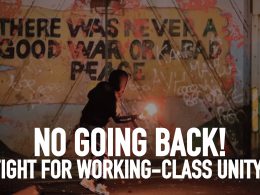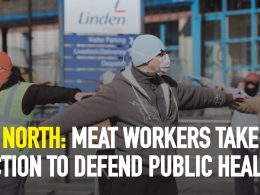Young people in Northern Ireland are angry and it’s not surprising. We face a jobs crisis, with almost 25% of 16-24 year olds not in employment, education or training. The only jobs that are available for most are low-paid call-centre, retail and service positions, with long hours, poor conditions and no job security.
Cuts to housing benefit are forcing young people to stay with their parents, robbing them of independence, because they can’t afford the rip-off rents charged by landlords. University and college places are being slashed and EMA is under threat again. Stormont have launched a consultation on EMA’s future and the “best” option they’ve presented will result in a 50% reduction in the number of people being able to receive an even smaller amount. The Assembly politicians have no solutions to these problems. They are happily implementing massive austerity, making young people and workers pay for the capitalist crisis caused by the super-rich. Meanwhile, they cynically try to distract from these problems by playing the sectarian card, whipping up tensions around issues like parades.
80 years after the Outdoor Relief Strike
The Great Depression of the 1930s brought mass unemployment to Belfast. Those who couldn’t find work were faced with the choice of confinement to the workhouse or pleading their case to the Board of Guardians – representatives of the rich – in order to receive Outdoor Relief in return for manual labour, usually street repairs. Those in receipt of this Outdoor Relief received payment in kind, not cash. They were shamed by having their names written on gable walls. The levels of relief were so low that they left families in grinding poverty.
In October 1932, thousands of outdoor relief workers in Belfast went on strike to fight for their dignity and benefits they could live on. With the support of the wider working-class, they organised mass rallies and marches with workers from all over Belfast. The struggle united Catholic and Protestant workers in the face of violence from bigots and the state – police attacked workers on the Falls in a conscious attempt to divide the movement and pit community against community. Crowds from the Shankill rushed to defend the Catholic workers under attack. After two weeks of struggle, the Board of Guardians conceded and concessions were won.
Join the March for a Future!
This is only one of many examples of workers and young people uniting across the sectarian divide to fight for their common interests. December 2010 saw thousands of students and workers demonstrate at City Hall and effectively scare the politicians into not increasing tuition fees or cutting EMA in Northern Ireland. Youth Fight for Jobs has called a March for a Future on 6 October in Belfast to mark the eightieth anniversary of the Outdoor Relief Strike and to protest youth unemployment and the whole austerity agenda. It will begin from the Custom House Square – where the strike was called – before marching along the Shankill and crossing the peace-line to the Falls. This march will bring together young people, trade unionists and activists from both communities to put our common interests centre-stage and challenge sectarian division. Everyone who wants to fight for a better future – young or old, Catholic or Protestant – should join us on the march.











